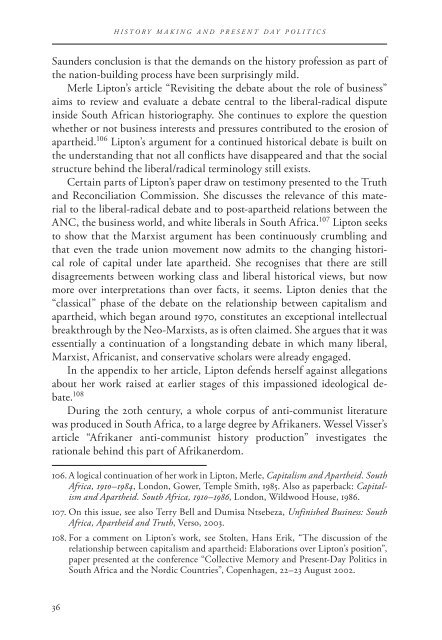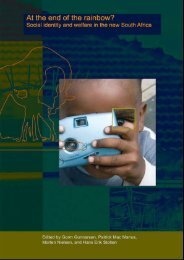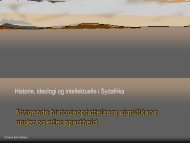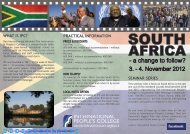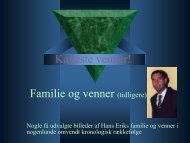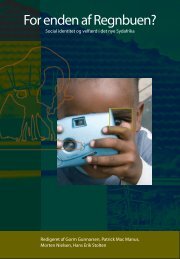History Making and Present Day Politics - Stolten's African Studies ...
History Making and Present Day Politics - Stolten's African Studies ...
History Making and Present Day Politics - Stolten's African Studies ...
You also want an ePaper? Increase the reach of your titles
YUMPU automatically turns print PDFs into web optimized ePapers that Google loves.
h i s t o r y m a k i n g a n d p r e s e n t d a y p o l i t i c s<br />
Saunders conclusion is that the dem<strong>and</strong>s on the history profession as part of<br />
the nation-building process have been surprisingly mild.<br />
Merle Lipton’s article “Revisiting the debate about the role of business”<br />
aims to review <strong>and</strong> evaluate a debate central to the liberal-radical dispute<br />
inside South <strong>African</strong> historiography. She continues to explore the question<br />
whether or not business interests <strong>and</strong> pressures contributed to the erosion of<br />
apartheid. 106 Lipton’s argument for a continued historical debate is built on<br />
the underst<strong>and</strong>ing that not all conflicts have disappeared <strong>and</strong> that the social<br />
structure behind the liberal/radical terminology still exists.<br />
Certain parts of Lipton’s paper draw on testimony presented to the Truth<br />
<strong>and</strong> Reconciliation Commission. She discusses the relevance of this material<br />
to the liberal-radical debate <strong>and</strong> to post-apartheid relations between the<br />
ANC, the business world, <strong>and</strong> white liberals in South Africa. 107 Lipton seeks<br />
to show that the Marxist argument has been continuously crumbling <strong>and</strong><br />
that even the trade union movement now admits to the changing historical<br />
role of capital under late apartheid. She recognises that there are still<br />
disagreements between working class <strong>and</strong> liberal historical views, but now<br />
more over interpretations than over facts, it seems. Lipton denies that the<br />
“classical” phase of the debate on the relationship between capitalism <strong>and</strong><br />
apartheid, which began around 1970, constitutes an exceptional intellectual<br />
breakthrough by the Neo-Marxists, as is often claimed. She argues that it was<br />
essentially a continuation of a longst<strong>and</strong>ing debate in which many liberal,<br />
Marxist, <strong>African</strong>ist, <strong>and</strong> conservative scholars were already engaged.<br />
In the appendix to her article, Lipton defends herself against allegations<br />
about her work raised at earlier stages of this impassioned ideological debate.<br />
108<br />
During the 20th century, a whole corpus of anti-communist literature<br />
was produced in South Africa, to a large degree by Afrikaners. Wessel Visser’s<br />
article “Afrikaner anti-communist history production” investigates the<br />
rationale behind this part of Afrikanerdom.<br />
106. A logical continuation of her work in Lipton, Merle, Capitalism <strong>and</strong> Apartheid. South<br />
Africa, 1910–1984, London, Gower, Temple Smith, 1985. Also as paperback: Capitalism<br />
<strong>and</strong> Apartheid. South Africa, 1910–1986, London, Wildwood House, 1986.<br />
107. On this issue, see also Terry Bell <strong>and</strong> Dumisa Ntsebeza, Unfinished Business: South<br />
Africa, Apartheid <strong>and</strong> Truth, Verso, 2003.<br />
108. For a comment on Lipton’s work, see Stolten, Hans Erik, “The discussion of the<br />
relationship between capitalism <strong>and</strong> apartheid: Elaborations over Lipton’s position”,<br />
paper presented at the conference “Collective Memory <strong>and</strong> <strong>Present</strong>-<strong>Day</strong> <strong>Politics</strong> in<br />
South Africa <strong>and</strong> the Nordic Countries”, Copenhagen, 22–23 August 2002.<br />
36


